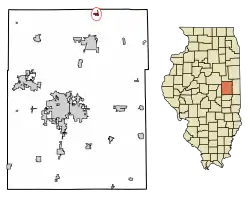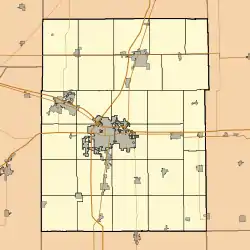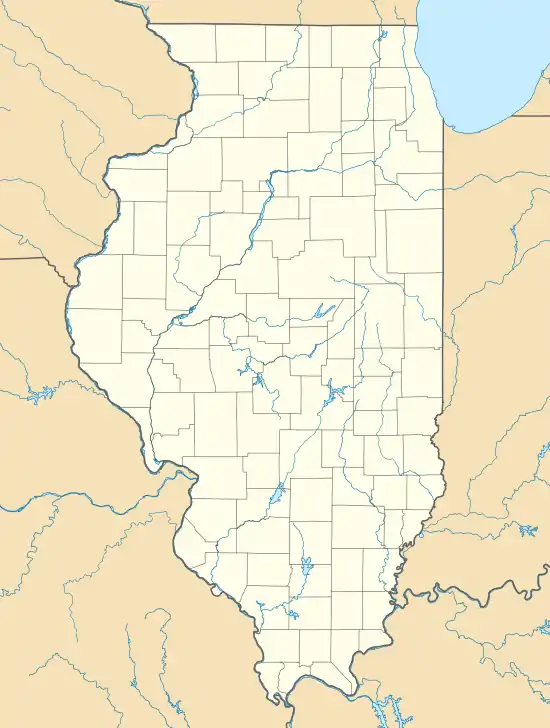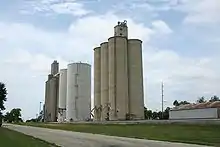Ludlow, Illinois
Ludlow is a village in Champaign County, Illinois, United States. The population was 371 at the 2010 census.
Ludlow | |
|---|---|
 Ludlow Post Office | |
 Location of Ludlow in Champaign County, Illinois. | |
 Ludlow Location within Champaign County  Ludlow Ludlow (Illinois) | |
| Coordinates: 40°23′10″N 88°7′37″W | |
| Country | United States |
| State | Illinois |
| County | Champaign |
| Area | |
| • Total | 0.40 sq mi (1.03 km2) |
| • Land | 0.40 sq mi (1.03 km2) |
| • Water | 0.00 sq mi (0.00 km2) |
| Elevation | 774 ft (236 m) |
| Population (2010) | |
| • Total | 371 |
| • Estimate (2019)[2] | 356 |
| • Density | 896.73/sq mi (345.83/km2) |
| Time zone | UTC-6 (CST) |
| • Summer (DST) | UTC-5 (CDT) |
| Postal code | 60949 |
| Area code(s) | 217 |
| FIPS code | 17-45174 |
History
Ludlow was originally known as Pera or Pera Station. The village was renamed Ludlow in 1867 after Thomas W. Ludlow, a shareholder in the Illinois Central Railroad.[3][4]
Geography
Ludlow is located at 40°23′10″N 88°7′37″W (40.386248, -88.126856).[5]
According to the 2010 census, Ludlow has a total area of 0.36 square miles (0.93 km2), all land.[6]
Demographics

As of the census[8] of 2000, there were 324 people, 141 households, and 83 families residing in the village. The population density was 932.2 people per square mile (357.4/km2). There were 153 housing units at an average density of 440.2 per square mile (168.8/km2). The racial makeup of the village was 96.60% White, 2.47% African American, and 0.93% from two or more races. Hispanic or Latino of any race were 0.31% of the population.
There were 141 households, out of which 27.7% had children under the age of 18 living with them, 40.4% were married couples living together, 13.5% had a female householder with no husband present, and 41.1% were non-families. 36.2% of all households were made up of individuals, and 15.6% had someone living alone who was 65 years of age or older. The average household size was 2.30 and the average family size was 2.98.
In the village, the population was spread out, with 27.2% under the age of 18, 6.8% from 18 to 24, 33.6% from 25 to 44, 21.0% from 45 to 64, and 11.4% who were 65 years of age or older. The median age was 35 years. For every 100 females, there were 105.1 males. For every 100 females age 18 and over, there were 98.3 males.
The median income for a household in the village was $35,000, and the median income for a family was $41,875. Males had a median income of $37,917 versus $19,643 for females. The per capita income for the village was $19,507. About 9.1% of families and 15.0% of the population were below the poverty line, including 19.4% of those under age 18 and none of those age 65 or over.[9]
Cultural references
The town of Ludlow is identified as the first site of an invasion of giant locusts in the 1957 movie Beginning of the End.[10]
References
| Wikimedia Commons has media related to Ludlow, Illinois. |
- "2019 U.S. Gazetteer Files". United States Census Bureau. Retrieved July 14, 2020.
- "Population and Housing Unit Estimates". United States Census Bureau. May 24, 2020. Retrieved May 27, 2020.
- Callary, Edward. 2009. Place Names of Illinois. Champaign: University of Illinois Press, p. 208.
- Illinois Central Magazine. Illinois Central Railroad Company. 1922. p. 46.
- "US Gazetteer files: 2010, 2000, and 1990". United States Census Bureau. 2011-02-12. Retrieved 2011-04-23.
- "G001 - Geographic Identifiers - 2010 Census Summary File 1". United States Census Bureau. Archived from the original on 2020-02-13. Retrieved 2015-08-04.
- "Census of Population and Housing". Census.gov. Retrieved June 4, 2015.
- "U.S. Census website". United States Census Bureau. Retrieved 2008-01-31.
- Census.Gov. United States Census Bureau https://www.census.gov/search-results.html?q=Ludlow+village%2C+IL&page=1&stateGeo=&searchtype=web. Retrieved 25 August 2015. Missing or empty
|title=(help) - "Synopsis for Beginning of the End (1957)". IMDB. Retrieved 14 November 2015.